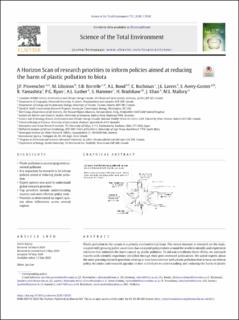| dc.contributor.author | Provencher, JF | |
| dc.contributor.author | Liboiron, M | |
| dc.contributor.author | Borrelle, SB | |
| dc.contributor.author | Bond, AL | |
| dc.contributor.author | Rochman, C | |
| dc.contributor.author | Lavers, JL | |
| dc.contributor.author | Avery-Gomm, S | |
| dc.contributor.author | Yamashita, R | |
| dc.contributor.author | Ryan, PG | |
| dc.contributor.author | Lusher, AL | |
| dc.contributor.author | Hammer, S | |
| dc.contributor.author | Bradshaw, H | |
| dc.contributor.author | Khan, J | |
| dc.contributor.author | Mallory, ML | |
| dc.date.accessioned | 2020-07-03T11:51:49Z | |
| dc.date.available | 2020-07-03T11:51:49Z | |
| dc.date.created | 2020-05-25T11:38:30Z | |
| dc.date.issued | 2020 | |
| dc.identifier.citation | Science of the Total Environment. 2020, 733, 139381 | en_US |
| dc.identifier.issn | 0048-9697 | |
| dc.identifier.uri | https://hdl.handle.net/11250/2660714 | |
| dc.description | © 2020 The Authors | en_US |
| dc.description.abstract | Plastic pollution in the oceans is a priority environmental issue. The recent increase in research on the topic, coupled with growing public awareness, has catalyzed policymakers around the world to identify and implement solutions that minimize the harm caused by plastic pollution. To aid and coordinate these efforts, we surveyed experts with scientific experience identified through their peer-reviewed publications. We asked experts about the most pressing research questions relating to how biota interact with plastic pollution that in turn can inform policy decisions and research agendas to best contribute to understanding and reducing the harm of plastic pollution to biota. We used a modified Horizon Scan method that first used a subgroup of experts to generate 46 research questions on aquatic biota and plastics, and then conducted an online survey of researchers globally to prioritize questions in terms of their importance to inform policy development. One hundred and fifteen experts from 29 countries ranked research questions in six themes. The questions were ranked by urgency, indicating which research should be addressed immediately, which can be addressed later, and which are of limited relevance to inform action on plastics as an environmental pollutant. We found that questions relating to the following four themes were the most commonly top-ranked research priorities: (i) sources, circulation and distribution of plastics, (ii) type of harm from plastics, (iii) detection of ingested plastics and the associated problems, and (iv) related economies and policy to ingested plastics. While there are many research questions on the topic of impacts of plastic pollution on biota that could be funded and investigated, our results focus collective priorities in terms of research that experts believe will inform effective policy and on-the-ground conservation. | en_US |
| dc.language.iso | eng | en_US |
| dc.publisher | Elsevier | en_US |
| dc.rights | Attribution-NonCommercial-NoDerivatives 4.0 Internasjonal | * |
| dc.rights.uri | http://creativecommons.org/licenses/by-nc-nd/4.0/deed.no | * |
| dc.title | A Horizon Scan of research priorities to informpolicies aimed at reducing the harm of plastic pollution to biota | en_US |
| dc.type | Peer reviewed | en_US |
| dc.type | Journal article | en_US |
| dc.description.version | publishedVersion | en_US |
| dc.source.volume | 733 | en_US |
| dc.source.journal | Science of the Total Environment | en_US |
| dc.identifier.doi | https://doi.org/10.1016/j.scitotenv.2020.139381 | |
| dc.identifier.cristin | 1812420 | |
| cristin.ispublished | true | |
| cristin.fulltext | original | |
| cristin.qualitycode | 2 | |

